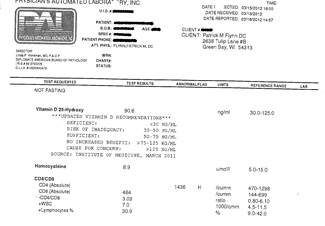An Uncommon Solution to a Common Health Issue

Allergies: why are they so common now?
Ok … Let me begin by asking a question. When you were in grade school, how often did you come across kids who had allergies? Now it is very common to have peanut-free zones or gluten free zones in school cafeterias. I remember a few of my friends having some allergies, but now it seems that it is rare to not have some kind of allergic response to something in our environment, whether it be food, animal, liquid, or plant. In fact, according to the U.S. National Library of Medicine – the World’s Largest Medical Library, “Allergies are pretty common”. [1],[5] Today it is more common to have them than not. And the younger you are today the chance is even higher. [2] According to the Center for Disease Control, 4 out of every 100 children have food allergies. So I went on the CDC and pulled a graph to show the increase. Click on the image to enlarge. [3]
Now let’s step back a moment and define an allergy. According to medical definitions and research, an allergy is simply an exaggerated (elevated) immune response to some kind of stimulus. [4]
Ok Doc…what’s that mean? It just means that when something comes into the body that doesn’t belong, or the body ‘thinks’ it doesn’t belong, the immune system responds too aggressively and now we experience a symptom. Here are the common symptoms:
- Eczema
- Breathing problems
- Red, Swollen, Itchy, Tearing Eyes
- Mental Fatigue
- Brain Fog
- Insomnia
- Abdominal Bloating
- Skin rashes and redness
- Hives
- Coughing
- Itchy mouth, nose, skin and other areas
- Loose Bowels
- Intestinal Cramping
Now, I know that some things on this list are pretty commonly known as symptoms and others are not. What I’d like to point out is that if you are experiencing any of these symptoms and have not yet addressed the problem as an immune issue, this would be a great place to start.
Once you have been diagnosed as having some type of allergy, the conventional medical model’s standard form of treatment includes anti-histamines, cortico steroids, decongestants or allergy shots. All of these treatments knock the immune response down so your symptoms disappear.
The problem with this form of treatment is that the allergies never go away…it sets your body up to a vicious cycle of chasing after never-ending symptoms.
Let’s look at allergies from a new perspective. In other words, let’s ask a different question… Why is the immune system responding in an exaggerated way?
First let’s take a look at things that can cause an exaggerated immune response:
- Medications
- Foods
- Pollens
- Insect bites
- Animals
- Molds
- Metals
- Chemicals
Most of these things are very obviously ‘foreign’ to the body, and a few are not. Ever heard of mercury poisoning or allergies to bee stings? What about an allergy to apples? Common or not, if your body has an exaggerated immune response to any of these things, chances are that your body will repeat that same response when introduced to both new and even common stimuli.
But, here is where I want you to think differently. You see, most of you that have allergies already know this information, and, as a result, you will simply avoid the things that exaggerate the immune response (your suspected or known allergens).
Wait…stop right there and take a step back and answer one question for me. What caused your immune system to react this way?
That is the key question that no one bothers to ask, and, more importantly, no one seems to know the answer to. When we were younger, the assault on our young immune systems was a lot less. Vaccines were at a much lower dosage, foods were not as processed, activity was more, the environment was less toxic and our moms were just not as sick and medicated as they are today.
I love visual analogies…so follow me as I illustrate what I like to call ‘The Bucket Theory”. It is actually not our theory – it is actually a theory that the medical community developed to determine how much of a drug could be given to a person without killing them. I, on the other hand, use “The Bucket Theory” to show how small amounts of toxins from numerous sources can fill your bucket over time.
Imagine that everyone has a bucket when they are born. As we encounter vaccines, medications, high concentrations of toxins in our environment, in our food, water and our home, our bucket fills up a little bit each time. Over time, all these toxins in our bucket become huge stressors to our immune systems, and, eventually, our bucket will over flow – resulting in an exaggerated immune response. Now most would assume that we are born with an empty bucket, but, sadly, this is hardly ever the case. I would estimate that most children born in the 21st century have buckets a quarter to half full, and even some over-flowing due to the toxicity of their mothers. Pregnant moms are taking medications and getting flu shots before their babies are even born. Most moms having complete ability to breastfeed their babies choose not to. They instead choose to give their children formulas that are immune suppressing. Then, add to it the fast-paced, stressful lifestyles that people have…it’s no wonder that our kids have so many allergies.
We’ve been conditioned since we were children to take something when we feel bad…to get fast relief. We grab for a medication to react to an immune response that was created. Yes, you read that right…created from all of the immune suppressing, assaulting things we do to our bodies on a daily basis.
But, guess what? THERE IS HOPE! Exaggerated immune responses can be changed! You don’t have to be stuck on that mouse wheel running and not getting anywhere. That medication that lowers your immune system so you don’t have symptoms does not have to be your answer. There is another way! But first, we have to stop causing our immune systems from having an exaggerated response by CHOOSING to build our immune systems right…not train it to respond incorrectly.
Wait Doc, so what you are saying is that if I have some allergies right now, and I am currently just lowering the immune response with a medical treatment and avoiding the allergens, I am teaching my immune system to react in the same way to other things?
Yes, you are exactly right! What you now see as just one allergic response can turn into several if you don’t get to the root of the problem and build your immune system correctly– it’s an immune issue!
We Don’t Guess…We Test!
If you currently have allergies or suspect you may have some undiagnosed, I recommend that you first get properly tested. A simple blood test can result in the beginning of a journey to a whole new you!The test I recommend is a CD4/CD8 ratio. The test I show below will take a snap shot of how your immune system is responding to its environment.

Once you’ve been tested, your doctor will be able to determine the best care for your specific needs.
REFERENCES:
- Sicherer, S.H., et al., US prevalence of self-reported peanut, tree nut, and sesame allergy: 11-year follow-up. J Allergy Clin Immunol, 2010. 125(6): p. 1322-6.
- Lack, G. and M. Penagos, Early feeding practices and development of food allergies. Nestle Nutr Workshop Ser Pediatr Program, 2011. 68: p. 169-83; discussion 183-6.
- Statistics, N.C.f.H., NCHS Data Brie, Number 10, October 2008, db10.pdf, Editor 2008. p. Food Allergy Among U.S. Children: Trens in Prevalence and Hospitalizations.
- Sicherer, S.H. and H.A. Sampson, Food allergy. J Allergy Clin Immunol, 2010. 125(2 Suppl 2): p. S116-25.
- Branum AM, Lukacs SL. Food allergy among U.S. children: Trends in prevalence and hospitalizations. NCHS data brief, no 10. Hyattsville, MD: National Center for Health Statistics. 2008.
